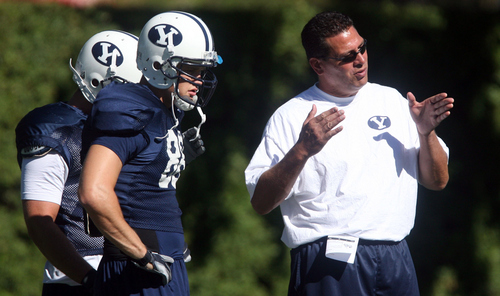This is an archived article that was published on sltrib.com in 2013, and information in the article may be outdated. It is provided only for personal research purposes and may not be reprinted.
Due to BYU's rehiring Robert Anae as offensive coordinator last week without the school's previously saying anything about Brandon Doman's status, my reaction focused immediately on Anae.
So now, I'll look more closely at Doman's two seasons in that position — and what it takes to be an offensive coordinator at this level of college football.
The basic answer is it requires more experience than Doman or Utah's Brian Johnson had before they were handed the keys to the offense. Consider the career of Utah State's Matt Wells. He may or may not be ready to succeed as a head coach, but he definitely was prepared to coordinate the Aggies' offense in 2012. Wells had spent 15 seasons in various positions at Navy, Tulsa, New Mexico (two stints), Louisville and USU before taking over the offense.
In contrast, Doman (six years) and Johnson (two years) had worked only at their current schools, coaching quarterbacks.
Doman may well have grown into the job, and Johnson still could do so. But clearly, they were not ready for the responsibilities that go far beyond calling plays on Saturdays. That job is tougher than it looks. It's largely about managing the meeting room, about being in charge of three or four other coaches who may have less experience or be entrenched in their positions.
Either way, the challenge involves incorporating other ideas, accepting just the right amount of input and ultimately making decisions.
That's not easy for a young coach, which is not to say there should be a minimum age for a coordinator. But experience helps. Undoubtedly, Bronco Mendenhall and Kyle Whittingham benefited from their chances to serve as coordinators before they came to BYU or Utah as assistant coaches.
I'm a traditionalist when it comes to the coaching profession, and I liked the old model of having Mendenhall (Northern Arizona) and Whittingham (Idaho State) start at a lower level and work their way up. The irony is they're not making the current generation of coaches serve similar apprenticeships. That's how they have Doman and Johnson quickly rising to key positions and someone such as Ben Cahoon coaching BYU's receivers in his first job.
The results would suggest the current model is not working. And that's partly why Doman was doomed to fail. Cahoon was a coaching novice; Lance Reynolds was at the other extreme. Doman had to manage and motivate both of them.
As for whether Mendenhall hamstrung Doman by making him play Riley Nelson at quarterback, that's trickier. We'll never know what would have happened if Taysom Hill had remained healthy after winning his two starts when Nelson was injured.
Doman's mistake may have been promoting Hill over James Lark. If Lark had played well against Hawaii and Utah State (as Hill did), maybe Lark could have kept the position and thrived. But as it was, starting Lark over Nelson against Oregon State or Notre Dame probably would not have changed those outcomes.
Regardless, Doman's first opportunity to be a coordinator did not go well. He's sure to get another shot someday — but where that will happen is another issue. I believe he and BYU both would be well served if he were to accept his demotion and remain the Cougars' quarterbacks coach. Then again, going elsewhere for a couple of years worked out for Anae, didn't it?
Twitter: @tribkurt



